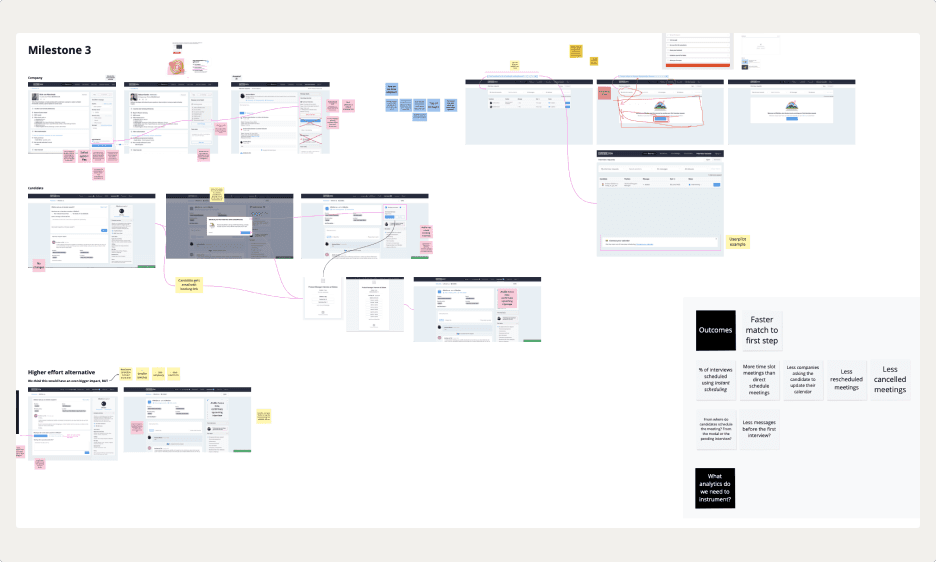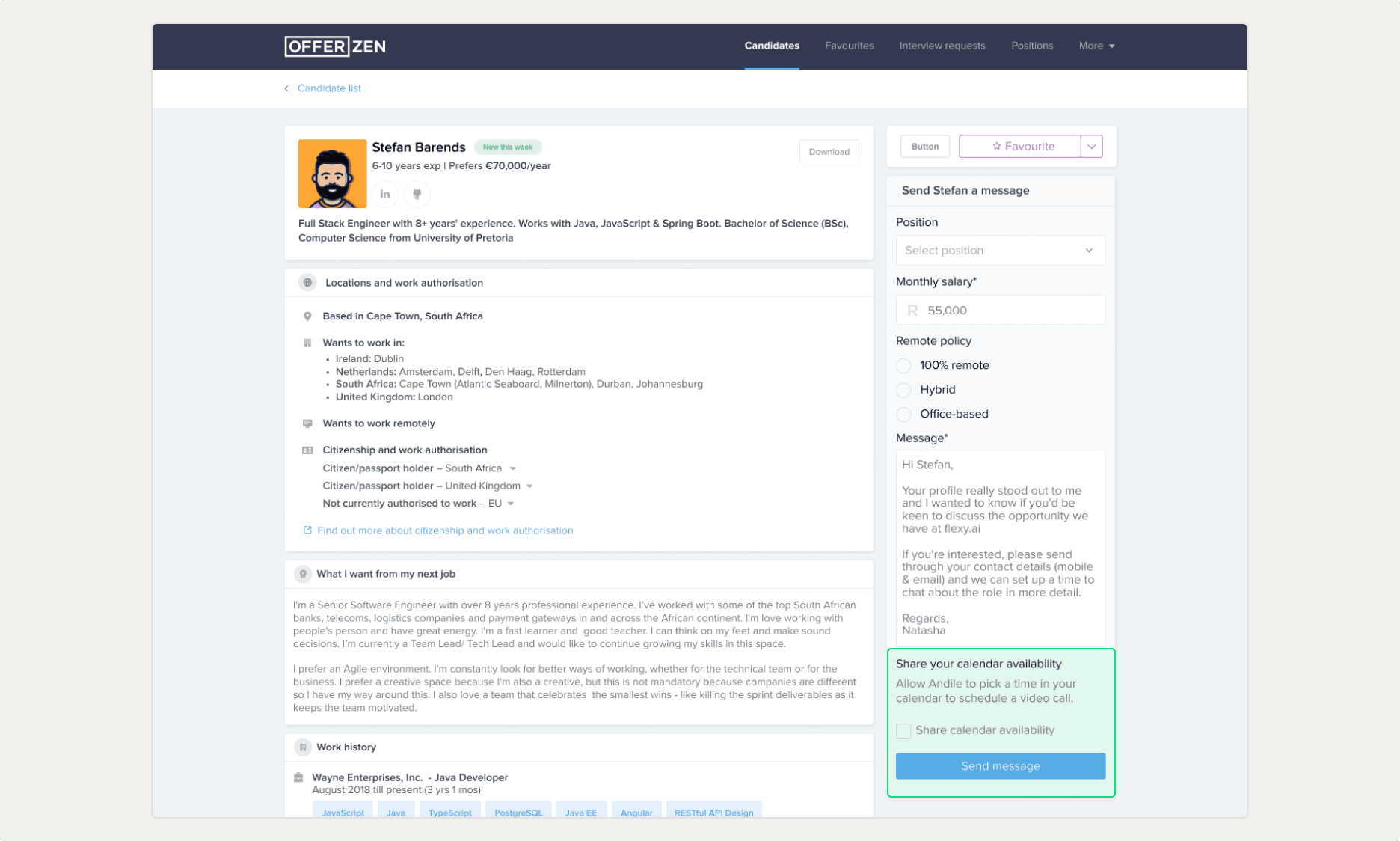Helping hiring teams to schedule interviews faster
I was responsible for end-to-end design of the new interview scheduling feature. This was the final milestone of a large and complex project.
Our team had recently updated OfferZen’s interview scheduling feature by integrating with the third-party scheduling provider Cronofy. This update gave us the opportunity to address one of the biggest friction points in the company and candidate journey; getting the first interview scheduled after they connect.
Context
Problem
Goal
Reduce friction in the candidate and compay user journey from reach-out message to first interview scheduled.
Success metrics
Decrease time from match to first interview.
User research
Sharing availability is effortful
Candidates are asked to manually update their availability on OfferZen. This feature is old and effortful to use.
Updating availability is unrealistic
Candidates’ availability fluctuates daily. They don’t have the time to update OfferZen every time their availability changes.
Waiting for a response is stressful
Candidates expect companies on OfferZen to have high intent. They feel stressed when companies don’t respond quickly.
Setting up an interview is effortful
Company members reach out to many candidates. If the majority are interested, there is significant admin overhead to schedule interviews.
Candidate response times can be slow
Candidates tend to manage their job search after hours, meaning communication delays can be significant (up to 8 hours or more).
Asking for candidate availability is frustrating
Many candidates don’t keep their availability up to date. Company members need to ask for their availability before scheduling an interview.
Solution
Enable company members to share their availability with candidates in the first reach-out message so that candidates can schedule the first interview for a time that suits them.
Hypothesis
The first interview for a match will be scheduled faster if candidates can book time directly in a company member’s calendar.
If a candidate can access a company member’s availability in their calendar we significantly reduce the need for candidate availability to be updated on OfferZen.
Candidates have multiple options to choose from, further reducing the need for back and forth in the message thread.
Enabling interview scheduling earlier in the user journey allows us to make the most of candidate time spent on the platform.
Tradeoff
Reducing the solution to it’s core value enabled us to ship value fast, learn and iterate. With that in mind, it was important to limit scope. I reduced complexity in the solution by applying default scheduling settings, based on available interview scheduling data.
Risk
The default scheduling settings won't align with the preferences of every company member on the platform. Some users might decide not to use the feature as a result.
Wireframes
For this project the UI changes needed were small but impactful. I used screenshots, rough sketches, and annotations in Miro to create mid-fidelity wireframes and rapidly explore different options.

Multiple user journey options explored in Miro
Collaborating with my team
I shared my exploratory sketches with the Product Manager and Engineering Manager in my team. We discussed the technical implications, usability, and feasibility of each option. After our discussion, I refined our preferred user journey to share with the rest of the team.
I presented the user journey to the rest of the team in a session where they could easily comment and make suggestions directly on the wireframes.

Sketches and notes added to the mid-fidelity wireframes during a team session
User testing
I tested the user journey with OfferZen’s internal Talent Acquisition Specialists. They are regular users of the product and in an excellent position to help us identify complexity and usability problems.
Assumptions
Company members will understand what it means to share their availability.
Company members are willing to share their availability with candidates.
Company members will accept the proposed default scheduling settings.
Findings
Talent Aquisition specialists understood that candidates would be able to see their calendar availability and schedule an interview with them. They were excited about the idea. They didn't raise concerns about the default scheduling settings.
Risks addressed
Sindiswa mentioned that she would edit her reach-out message to mention the scheduling link she included.
This is risky because the candidate won’t see a link, they will see a regular interview invitation. The copy was updated to describe the candidate experience more accurately.
Sharon wanted to be informed that candidates can select any open time slot in her calendar, so that she could manage her availability accordingly.
I updated the feature heading to address her concern.

An option to share calendar availability was added to the reach-out message box for company members.
The candidate experience with OfferZen + Cronofy integration for interview scheduling
Results
Future improvements
Enable company members to manage their own scheduling preferences. This will create greater alignment between OfferZen hiring tools and company member’s processes and workflow.
Candidate availability improvements
What I learned
I was reminded again that the impact of a good solution in users’ hands is more valuable than a perfect solution in Figma. In the process I improved my ability to identify the core value that could be shipped to users. Starting with a clear hypothesis helped us to identify the core value of the solution to test with users, enabling the team to ship fast, learn and iterate.